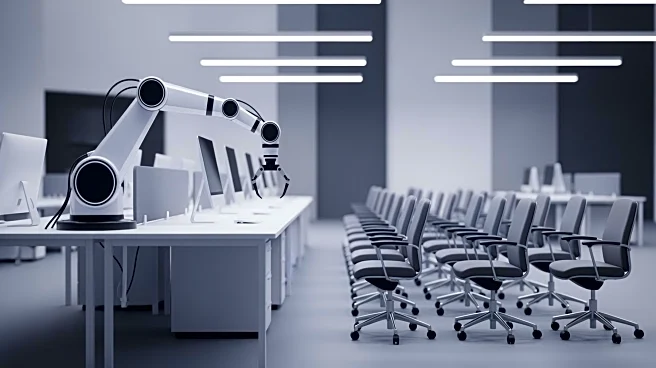What's Happening?
A recent report by global consulting firm Korn Ferry reveals that over 40% of companies are planning to replace roles with artificial intelligence, particularly in operations and back-office functions.
This trend is expected to impact entry-level positions significantly, with 37% of companies targeting these roles for AI replacement. The report, based on a survey of more than 1,670 global talent leaders and 230 Korn Ferry experts, highlights a potential leadership crisis. By reducing entry-level hires, companies may save costs in the short term but risk depleting the pipeline for future leaders. Jeanne MacDonald, CEO of Korn Ferry's recruitment process outsourcing, emphasized the need for leaders to balance innovation with the development of future leaders.
Why It's Important?
The shift towards AI in the workforce presents a significant challenge for talent acquisition professionals. As AI becomes more integrated into business operations, the traditional pathway for developing future leaders through entry-level positions is being disrupted. This could lead to a leadership vacuum if companies do not invest in training and development. The Korn Ferry report underscores the importance of critical thinking skills, with 73% of talent acquisition leaders prioritizing these skills when evaluating potential hires. The findings suggest that while AI can enhance efficiency, it cannot replace the need for human judgment and decision-making. Companies must ensure that their workforce is equipped to work alongside AI, evaluating its recommendations and knowing when to override its outputs.
What's Next?
To address the challenges posed by AI integration, talent acquisition leaders need to align AI implementation with C-suite ambitions and communicate this vision across the workforce. This involves ensuring that teams can effectively blend AI and human skills to drive business strategy. Additionally, companies must invest in training programs to prepare entry-level workers for the evolving job landscape. Failure to do so could result in a critical skills shortage, as highlighted by a report from General Assembly, which found that many entry-level workers are not adequately prepared for their roles. As AI continues to reshape the workforce, companies have a responsibility to develop the next generation of leaders.
Beyond the Headlines
The increasing reliance on AI raises ethical and cultural questions about the future of work. As AI takes on more roles traditionally held by humans, there is a risk of widening the skills gap and exacerbating inequality in the job market. Companies must consider the long-term implications of AI adoption, including its impact on employee morale and organizational culture. By fostering a culture of continuous learning and development, businesses can mitigate these risks and ensure a sustainable transition to an AI-enhanced workforce.










